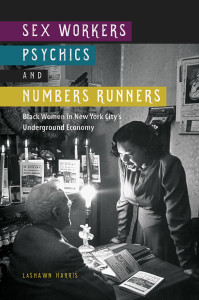 LaShawn D. Harris, an assistant professor of history, has been chosen to receive the 2017 Darlene Clark Hine Award from the Organization of American Historians. The award is given annually to the author of the best book of the year on African American women’s and gender history.
LaShawn D. Harris, an assistant professor of history, has been chosen to receive the 2017 Darlene Clark Hine Award from the Organization of American Historians. The award is given annually to the author of the best book of the year on African American women’s and gender history.
Dr. Harris was recognized for the book Sex Workers, Psychics, and Numbers Runners: Black Women in New York City’s Underground Economy (University of Illinois Press, 2016). According to the judges at the Organization of American Historians, the book is “groundbreaking labor and Black women’s history centered on the lives of African-descended women whose intersectional marginality – race, gender, class, labor profile, and criminal status – place them far beyond the ‘typical’ subject of historical analysis.”
Dr. Harris earned a Ph.D. at Howard University in Washington, D.C.











